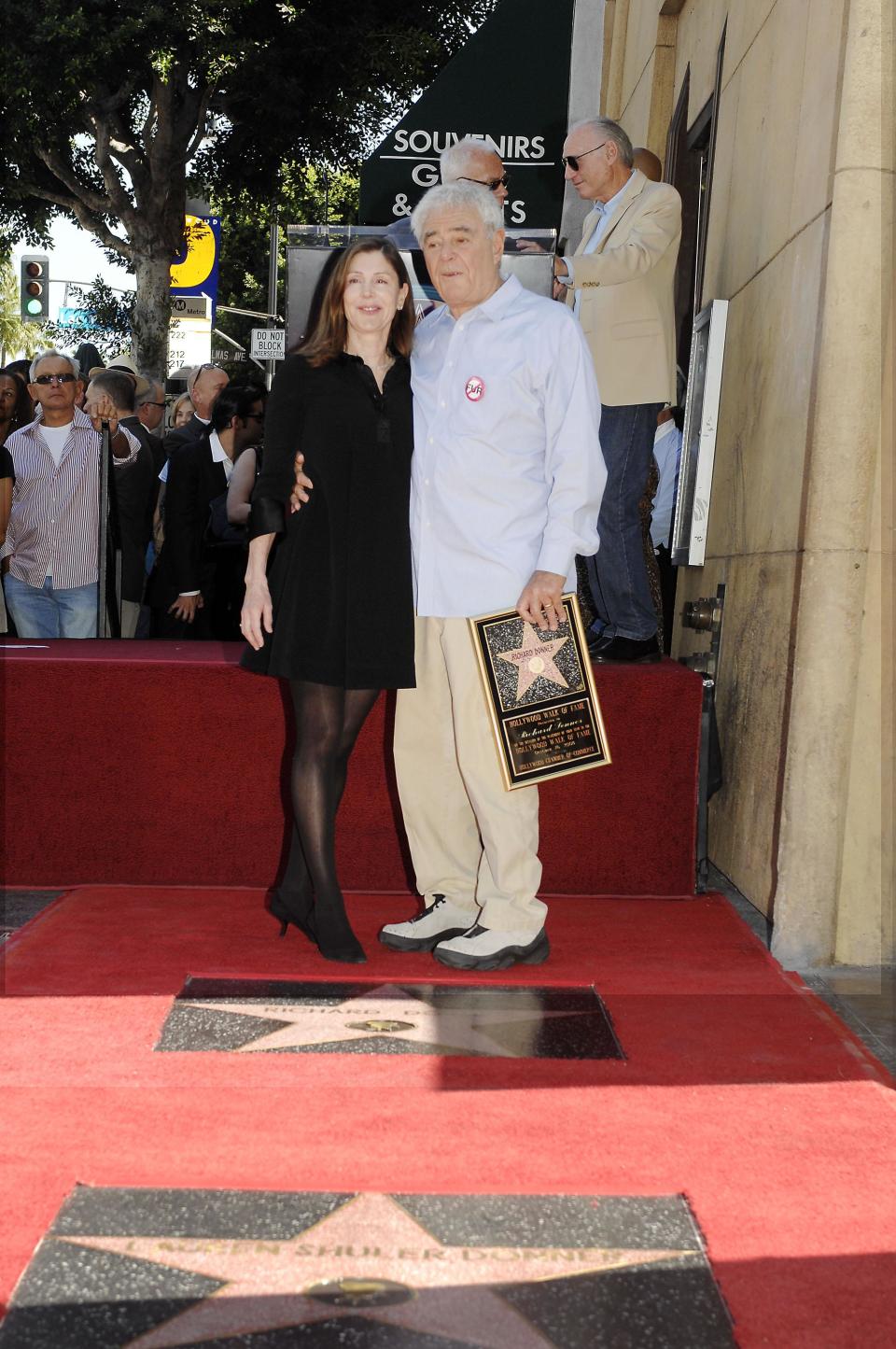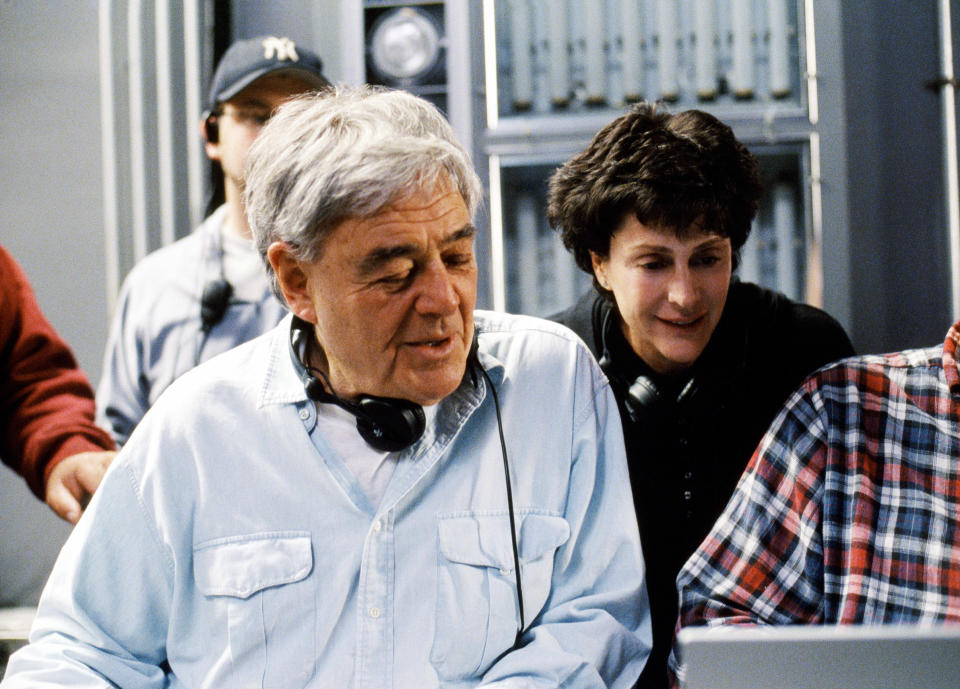Lauren Shuler Donner Reflects on Richard Donner’s Hollywood Legacy, From ‘Superman’ to ‘The Goonies,’ and His Gift of ‘Embracing Life and Humanity’
- Oops!Something went wrong.Please try again later.
- Oops!Something went wrong.Please try again later.
- Oops!Something went wrong.Please try again later.

In the days since legendary filmmaker Richard Donner’s death at age 91, his longtime wife, Lauren Shuler Donner, has taken comfort in the outpouring of love and support from the “Superman” director’s fans and colleagues.
“Each one is more remarkable than the next,” Shuler Donner tells Variety about the stories she’s heard about her late husband. “He was a prankster, a lover. He was an extraordinary man, and I want everybody to celebrate him in their own way.”
More from Variety
Since news broke of Donner’s death on Monday, industry leaders including Steven Spielberg (who wrote the story for “The Goonies”) and Donner’s “Lethal Weapon” stars Mel Gibson and Danny Glover have been among those publicly mourning the director’s passing.
“Somebody who’s prominent in the business, told me that when they were young [in the 60s or 70s], they were somewhere, and suddenly there was a ripple in the room, and somebody whispered, ‘Dick Donner’s here,'” Shuler Donner recounts. “They turned and there was this handsome guy. He said, ‘He looked like Errol Flynn. This man walked in and it was like the seas parted.'”
Like Donner was described in that story, Shuler Donner believes her husband was “pretty damn handsome” until the day he died, but his appeal went far beyond his looks. “He would light up the room. He had a big booming laugh, and a hug,” she explains. “He made you feel like you were really special, and that was his personality. That was his gift — embracing life and embracing humanity.”
Shuler Donner is an A-list producer in her own right. Married since 1986, the couple collaborated on “Ladyhawke,” “Radio Flyer” and “Timeline,” while their Donners’ Company production banner was also responsible for the “Free Willy” movies, the “X-Men” franchise and “Legion” on FX, among other hits. Donner and Shuler Donner’s Hollywood achievements were memorably (and permanently) commemorated with stars located next to each other on the Hollywood Walk of Fame.

Everett Collection
“I’m so lucky we were together that long,” Shuler Donner says. “I grew with him; I learned from him. For me, for my career, I wouldn’t be where I am today without his advice and pure osmosis, watching him on the set, and learning how to command a set and respect the crew.”
The producer says Donner also imparted to her how important it was to “have fun when the chips are down and lift everybody up. He also taught me not to sweat the little things. He gave me the gift of realizing it’s fine to relax and focus on what’s important.”
“I think the most telling and amazing thing is that while the memories are being broadcast are from people of note, but this morning, the valet in our office came crying to me,” adds Derek Hoffman, vice president of development and production at The Donners’ Company. “Everyone will tell you that Dick Donner made everyone feel cared for. Being remembered as much as a man as he is as a filmmaker, and I think that is the most special part all of this for me.”
Hoffman recalls a moment on the 2003 sci-fi adventure “Timeline” where he saw Donner’s generosity in action.
“It was my first movie with him and it was my first big million-dollar feature. I was still waiting for the glass to crack, to shatter that idea that he couldn’t really be this nice,” Hoffman says, explaining that Donner’s style was vastly different than that of the stereotypical Hollywood director. “He had a big booming voice [but] he never yelled at anyone, he yelled to everyone. But he didn’t dress you down; he never made anyone feel small.”
But one day, Hoffman says, the production was on location at a castle in Montreal when he heard something strange — Donner was yelling at someone.
“I came running over to the courtyard and see this best boy carrying a light, and Dick was like, ‘What the hell are you doing here? What are you doing on my set?'” Hoffman continues. “The guy was so confused and he was stammering to get out an answer. Then Dick got quiet and said, ‘Doesn’t your kid have a game today?'”
When the crew member protested, Donner insisted that he leave the set and go to his son’s game. “Dick quietly said to him, but we could all hear, ‘I need you for the rest of the movie, but he needs you today,'” Hoffman says, explaining that Donner had overheard the crew member talking about the game at craft services and took the conversation to heart.

©Paramount/Courtesy Everett Collection
“[What Donner did] wasn’t to inspire anyone; it was truly to give that man what he needs in in that moment,” he explains. “In the middle of this ridiculous production, and doing all these insane things, it was the people that were always the most important to him.”
While Donner may not have intended to inspire anyone with his actions that day off screen, but the filmmaker inspired the industry at large with his work onscreen. After a prolific career directing television in the 1960s and fresh off directing the horror classic “The Omen,” Donner took flight with “Superman,” essentially inventing the superhero genre.
Shuler Donner says the first thing that set the 1978 adventure apart was the sense of fun and excitement Donner imbued in the movie. “He hit that out of the park,” she says. “But he also realized, and I realized by watching his films, that the important thing was to ground the characters and make them real.”
“You have to believe a man could fly technically, but you had to be with Christopher Reeve, with Clark Kent / Superman and go with him when he flew,” she explains. “And that was what Dick did; he worked with Chris to make him a Superman that reached out to the audience and pulled them in with him on his journey.”
From there, the classic movie, starring Reeve, Gene Hackman, Ned Beatty, Marlon Brando and Margot Kiddder (whose Lois Lane, Donner said, was one of the keys to making the audience truly invest in the character), inspired the evolution of the genre, including the “X-Men” movies Shuler Donner produced.
“The funny thing is that he never saw the X-Men movies. He saw one,” she says with a laugh. “We offered Dick to direct them, that’s why we gave him an executive producer credit. He said ‘I did it,’ and had done it — he did ‘Superman I’ and ‘II’. He did it better than anyone. He taught us how to do it. And he didn’t want to do that again, so he was just there as support.”
Donner did pitch in on the film, serving in an advisory capacity on 2000’s “X-Men” and 2009’s “X-Men Origins: Wolverine,” and helping out with smaller problems with music and the like. But Donner’s Hollywood legacy was still ongoing at the time of his passing, with a few projects in development, including a sequel to his hit film “The Goonies,” but Shuler Donner isn’t exactly sure what will happen next on that front.
“‘The Goonies’ is a hard act to follow,” she explains. “I think what we learned while we explored doing a sequel is that there’s really no reason to do it unless it would better than the original. And we haven’t found that yet.”
Instead of trying to meet or surpass that high bar — especially considering that the original cast is all grown up now, Shuler Donner notes — the company developed an as-yet-titled “Goonies” project for television.
“It’s about the re-enactment of films that kids are doing in schools across the country, and ours centers on a high school in a town in Ohio,” she explains, saying that the show’s lead character will be returning to her hometown to see the kids working to win a contest with their “Goonies” re-enactment. “It will have the spirit of the Goonies; and we will explore their lives, and it will have a uniqueness in that respect.”
As Shuler Donner shared with Variety’s sister publication Deadline, she intends to celebrate Donner’s life later this year at Warner Bros., the studio where the filmmaker had a longterm deal and built much of his Hollywood legacy.
“We want to do it in Dick Donner style,” she says of planning the event. “If possible, I want to anybody who wants to celebrate Dick, who knew him, to be able to come, trade good stories, funny stories, and go home feeling that they had a little closure.”
Best of Variety
Sign up for Variety’s Newsletter. For the latest news, follow us on Facebook, Twitter, and Instagram.

